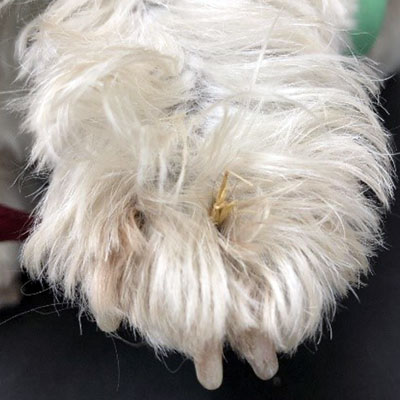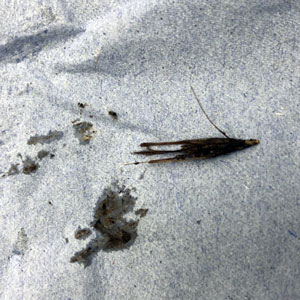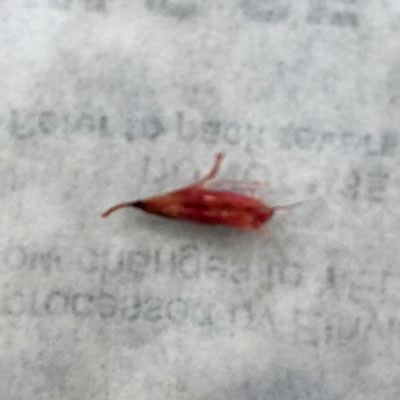During warm summer months grass seeds are a common danger to your dogs, and at times cats too. These seeds can cause a lot of pain, discomfort, infection and more complex health issues.
The seeds that commonly cause animals this discomfort are found growing from long grasses and are transferred to your animal as they brush past them on walks or in the garden. They reach their most hazardous time from late spring to the end of summer. These small seeds, usually from foxtail plants, have a pointed shaft and an arrow like appearance which easily get caught in an animal’s fur and can end up burrowing into the skin. Because of the backwards facing barbs they can only travel in one direction and then become stuck within the layers of the dermis (skin). These seeds also contain bacteria that can cause further injury to the animal by causing a larger infection.
Figure 1. A grass seed starting to embed in a paw. (Packer, 2020)
Although small in size, the irritation from these seeds can be vast and at times many animals will not display obvious clinical signs at the time of irritation. The common areas that these seeds can effect are the paws and ears. However, these seeds can also cause serious damage to many other areas of the body including eyes, nose, airways, mouth and even the stomach.
The most common places that are presented to us at the practice are dog paws and ears. A grass seed that has embedded itself into a dog’s paw will cause a variety of clinical signs. These will vary from case to case but typically it will start with the dog being irritated on a particular paw, they may start to lick or chew the area and this is often paired with a swelling and small hole. They may become lethargic and usually become lame on that paw due to pain. Once embedded these seeds can travel up the limb and may cause swelling higher on the limb.
An animal that has a grass seed lodged in the ear will again show various clinical signs, the most common will be scratching at the ear, head shaking and redness around the ear canal. A seed in the ear can cause further complications. If left untreated the seed could work its way down and rupture the tympanic membrane (inside the ear) and cause permanent hearing loss.
Figure 2. Grass seed extracted from a dogs ear. (Packer, 2020)
All dogs have the potential to have a grass seed affect them however some breeds are more commonly affected. In a statement released by Petplan (2013) they noted that the most common are Cockapoos, Springer Spaniels and Cocker Spaniels. Breeds that have feathering on their paws are most affected by seeds becoming lodged between the pads, however it is not limited to these breeds and smooth coated animals are often affected too.
 Figure 3. Grass seed removed from a paw. (Packer,2020)
Figure 3. Grass seed removed from a paw. (Packer,2020)
As with most illnesses prevention is better than cure! To prevent the above happening there are steps that can be put in to place to ensure that these pesky seeds do not cause harm. The first is to attempt to keep your animal away from long grasses, however if they do venture in to these areas give the animal a good inspection at home and remove any grass seeds that are present. Check the animal all over but make sure to check between the toes, under the paw between the pads, armpits, groin, around the face, around the ears and under the ear pinna (flap).
Keeping longer coated dogs clipped or well-groomed will also reduce this risk. Feather footed animals will benefit from the longer coat on the paws being clipped away. This makes it harder for the grass seed to become embedded and also easier to inspect regularly.
If you suspect your animal has a grass seed them please contact the practice for further advice and treatment. Your Vet will be able to examine the animal and then make an individual treatment plan. This could range from local anaesthetic to a full general anaesthetic to remove the seed, flush out infection and prescribe medication.
In conclusion grass seeds can cause many problems for our beloved animals and vigilance is key to ensuring your pet remains free from these hazards. If you have any concerns for your pet please call the practice on 01483 536036.
Spread the cost of essential healthcare for your pet

To spread the cost of routine and essential healthcare for your pet, we offer our Pet Health for Life plan, which includes an annual health check, vaccinations, microchipping, 2 vet consultations, 2 nurse consultations and discounts on services.






